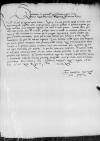⌊Sigismundus⌋ Dei gratia rex ⌊Poloniae⌋, magnus dux ⌊Lithuaniae⌋, ⌊Russiae⌋, ⌊Prussiae⌋ ⌊Masoviae⌋que etc. dominus et heres
Quod Paternitas Vestra non gravatim fecisse se ⌊⌋, ut ad ⌊Mariemburgense castrum⌋ nostrum proficisceretur atque ibi quomodo se habuerit negotium Pucense, una cum aliis diligenter expendit, fuit nobis id valde gratum. Gratius autem, quod idem onus iterum ferre non recusat quodque etiam ad comitia se venturam pollicetur, ubi opera Paternitatis Vestrae correctum iri errorem, qui in proximis superioribus comitiis admissus est, spem non dubiam concepimus.
Porro, quid in causa Pucensi fieri velimus a Paternitate Vestra, ex ⌊⌋ commissionis nostrae, quas illi misimus, cognoscet. Quam hortamur, ut operam suam interponat, quo semota quavis cunctatione ⌊bona Pucensia⌋ ad nos redeant. Quae secretius ad nos in scheda scripsit, ea in optimam partem accipimus neque enim dubitamus, quin ex summa erga nos fide atque observantia sint profecta. De qua eam opinionem iam pridem concepimus, nullius ut esse possit auctoritas tanta, cui nos credere animum inducamus, si quid secus de illa quispiam esset dicturus. De cudendis denariis in ⌊regni nostri comitiis⌋ consultabimus, interea et ⌊consiliariis terrarum nostrarum Prussiae⌋ scripsimus, ut et ipsi suam nobis sententiam perscribant.
Bene valeat Paternitas Vestra.

